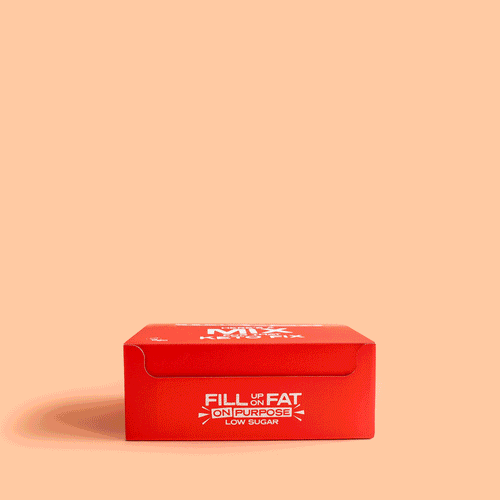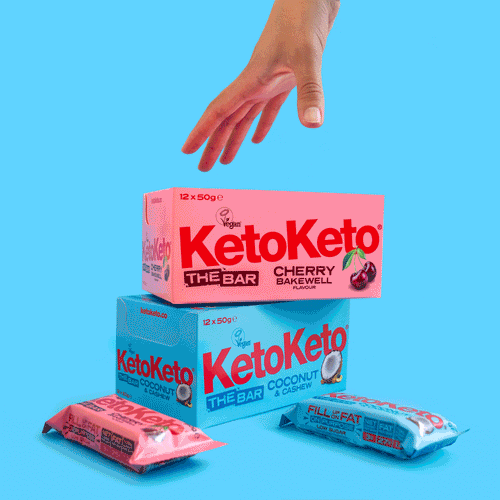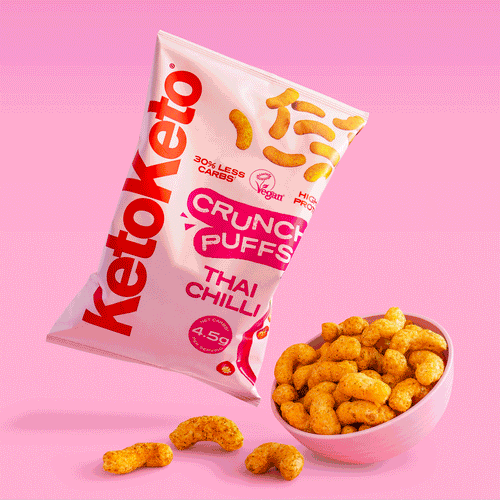For a long time fat has been given a bad name. It’s been identified as a source of ill-health for decades; consequently most modern diets and healthy eating advice tell you to avoid fat and up the carbohydrates.
Keto goes against the grain, quite literally, by advocating a high-fat, low-carb eating plan. Despite contradicting most well-known healthy eating advice, a Ketogenic diet has been shown to improve weight loss₁ and other health issues such as diabetes₂.
Recently, the UK government outlined new legislation around food that will come into force in October 2022. The new legislation concerns products high in fat, salt and sugar (HFSS) and therefore continues to perpetuate the idea that fat is bad for your health and should be avoided along with salt and sugar.
Is this new legislation repeating old mistakes by failing to take note of up-to-date research and findings? Consequently, will the HFSS legislation really be effective at improving public health? And can the Keto diet offer a different perspective that ought to be carefully considered?
What Is The HFSS Legislation?
From October 2022 new legislation will come into effect around how food and drinks high in fat, salt and sugar (HFSS) are promoted and advertised in store and online. HFSS foods are defined as foods scoring 4 points or higher, and drinks scoring 1 point or more in the UKs 2004-2005 Nutrient Profiling Model. Examples include: soft drinks, drinks with added sugars, cakes, sweets, cereals, pastries, ice-cream, pizza, chips and prepared meals.
Food and drinks identified as HFSS will be under new restrictions in order to reduce their availability to consumers. HFSS foods and drinks will no longer be included in special promotions such as ‘buy-one-get-one-free’, or placed in high-footfall areas within stores.
The point? An attempt to reduce fat, sugar and salt intake in the hope of improving obesity statistics in the UK. Obesity and overweight statistics continue to worsen year after year. In 2019, the Health Survey For England reported 28% of the UK are obese. Of adults aged 16 years and over, 68% of men and 60% of women are overweight or obese₃. Worryingly, 18% of boys and 13% of girls are also obese₃.

The belief that foods high in fat, salt and sugar lead to obesity has the government bringing in this new legislation to curb and control eating habits in order to improve the nation's health.
Let’s Talk About Fat
Fat has long been viewed as ‘bad’ for your health. Since the dietary recommendations of the 1980s which advocated a high-carb, low-fat diet; health professionals and the general public have perceived fat to be harmful to optimum health.
The new government dietary guidelines of 1983, increasingly popularised low-fat foods with many low or no-fat products performing well in the marketplace. Yet the nation's health has continued to deteriorate; with rates of obesity₃, diabetes₄ and cancer₅ increasing year upon year.
More up-to-date research suggests fat may not be the culprit for poor health and obesity. In fact some studies conclude a high-fat diet such as the Ketogenic diet, significantly reduces body weight and body mass₆. As well as decreasing levels of triglycerides, LDL [bad] cholesterol and blood glucose and increases the level of HDL [good] cholesterol’.
The truth is, there are many different types of fat and branding all fat as ‘bad’ is misleading. Some fats are extremely beneficial and necessary for bodily functions and good health. Fat is needed to regulate energy, protect vital organs, act as messengers, aid metabolism and help your body store nutrients₇.
Know Your Fat
Considering all fat to be equal is an oversimplified and incorrect view. There are different types of fat; most of which are necessary and beneficial for good health.
For example, monounsaturated fat has been found to improve blood cholesterol levels and decrease the risk of cardiovascular disease₈. Foods which contain monounsaturated fats include: nuts, olive oil and avocados.
Other essential fats your body needs to function are polyunsaturated fats - these are essential since your body cannot make them on its own, and you must therefore acquire them through your diet. Omega-3 is a type of polyunsaturated fat, shown to be particularly important to heart health₉. Foods high in Omega-3 include fish such as salmon, sardines, and trout, as well as nuts and seeds like walnuts, flaxseeds and chia seeds.
High-fat diets have also been found to improve weight loss₁ and diabetes₂. This is because high-fat diets like the Ketogenic diet, alter the body’s metabolic state into ketosis, which shifts the body from burning carbohydrates for energy to burning fat for fuel.
It’s also true that not all fats are healthy, and one type of fat that is best avoided for your health are trans fats. Trans fats are vegetable oils that have hydrogen added to make them solid at room temperature - to improve shelf-life and enhance the texture and flavour of products. These types of fat tend to be found in processed foods popular in modern Western diets.
Trans fats have been found to be harmful to health; a review by the New England Journal of Medicine found trans fats are responsible for increased risk of heart disease₁₀. The review goes on to mention the UK Food Standards Agency was pressing for a revision of nutrition labels to ensure these types of fats were labelled on products₁₀.
Despite these findings and calls to change policy, UK manufacturers are not required to list trans fat content on their food packaging.
Our bars are made to help curb cravings and keep you fuller for longer. With only 3g of net carbs per bar, they’re the
perfect Keto snack for anytime during the day. Save more when you buy more, by taking advantage of our Box Combo deal. Pick your favourite flavours or try a new
flavour for a change.
The KetoKeto Box Combo
Legislation For Health
This calls into question whether the HFSS legislation will do what it’s set out to do - improve health. After all, trans fats do not need to be identified yet foods high in total fat will be included in the new legislation. This demonises all fat while failing to identify the particular fats that can be detrimental to health. It seems this new legislation is once more misguided.
Blaming all fat for poor health is careless at best and harmful at worst. Consumers are confused and unable to make informed and healthy choices about the foods to eat for better health.
Healthy fats are necessary and beneficial for good health; eating a high proportion of fat has been shown to alter a person’s metabolic state, so they’re better able to lose weight and improve their blood sugar balance.
Yet the UK government has once again branded all fat as bad by bringing in this new HFSS legislation that once more communicates that a high-fat diet should be avoided in order to improve health and decrease rates of obesity.
It seems the same mistakes are still being made; government legislation and public health advice brought in carelessly without proper scrutinisation of current research.
Good Fats For Better Health
While many foods high in fat are harmful to your health, think chips, cakes, biscuits and pastries; this doesn’t make all fats bad. Many beneficial fats are found in nutritious foods such as nuts, seeds, oily fish, poultry, meat, avocados, coconut and olive oil.

Your body needs fat to function, and those following a Keto diet can advocate for its improvement to their health, in particular its positive impact on weight loss and balanced blood sugars.
Fat has become guilty by association and poor government guidance, often based on outdated research. This new HFSS legislation is unfortunately no different - it goes some way to help consumers become more aware of the foods they include in their diet.
However it once more misguides the public about what constitutes a healthy diet by suggesting all products with high-fat content should be avoided. A high-fat diet does not mean poor health. The contrary has been shown to be true in progressive and up-to-date research.
If the government wishes to bring in new legislation to help consumers make wiser choices around the food they buy in order to improve overweight and obesity statistics, they would do well to base their legislation on robust and accurate analysis of the scientific data - which clearly outlines that good fats are necessary for better health.
Sources
- National Center for Biotechnology Information, ‘Long-term effects of a ketogenic diet in obese patients’, https://www.ncbi.nlm.nih.gov/pmc/articles/PMC2716748/
- National Center for Biotechnology Information, ‘Effects of the Ketogenic Diet on Glycaemic Control in Diabetic Patients: Meta Analysis of Clinical Trials’, https://www.ncbi.nlm.nih.gov/pmc/articles/PMC7641470/
- Health Survey for England 2019,
https://digital.nhs.uk/data-and-information/publications/statistical/health-survey-for-england/2019
- diabetes.org.uk, ‘Diabetes Statistics’,
https://www.diabetes.org.uk/professionals/position-statements-reports/statistics
- Cancer Research Uk
https://www.cancerresearchuk.org/health-professional/cancer-statistics/incidence#heading-Zero
- National Center for Biotechnology Information, ‘Long-term effects of a ketogenic diet in obese patients’,
https://www.ncbi.nlm.nih.gov/pmc/articles/PMC2716748/#:~:text=CONCLUSIONS%3A,the%20level%20of%20HDL%20cholesterol
- National Institute of General Medicinal Sciences, ‘What Do Fats Do in the Body?’,
https://www.nigms.nih.gov/education/Inside-Life-Science/Pages/What-Do-Fats-Do-in-the-Body.aspx
- National Center for Biotechnology Information, ‘Protective effect of dietary monounsaturated fat on arteriosclerosis: beyond cholesterol’, https://pubmed.ncbi.nlm.nih.gov/12052487/
- The British Medical Journal, ‘Dietary fat and cardiometabolic health: evidence, controversies, and consensus for guidance’,
https://www.bmj.com/content/361/bmj.k2139#:~:text=In%20meta%2Danalyses%20of%20observational,risk%20of%20coronary%20heart%20disease
- National Center for Biotechnology Information, ‘Trans fatty acids and coronary heart disease’, https://www.ncbi.nlm.nih.gov/pmc/articles/PMC1523500/






